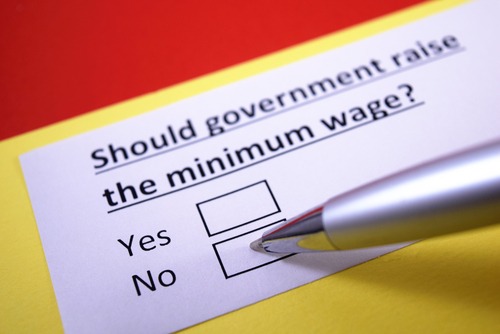
U.S. Sen. Pat Toomey (R-PA) said Monday that raising the federal minimum wage would have a harmful impact on jobs following a Congressional Budget Office (CBO) report on the budgetary effects of the Raise the Wage Act of 2021 (H.R. 603), which calls for the increase of the federal minimum wage, in annual increments, to $15 per hour by June 2025.
“The CBO has confirmed what we already knew: a universal and arbitrary federal $15-per-hour minimum wage will destroy jobs across the country,” Toomey said. “Our economy and job market are on the way back. A step like this, that CBO projects could kill between 1.4 million and 2.7 million jobs, is a surefire way to pull the rug out from under our recovery, send people to the unemployment line in droves, and eliminate job opportunities for so many entry-level workers.”
As part of his state FY 2021-2022 budget, Pennsylvania Gov. Tom Wolf has proposed a similar increase to the state minimum wage. His timeline would see the state minimum wage increased to $12 per hour effective July 1, with annual increases of $0.50 until the minimum wage reaches $15 per hour on July 1, 2027.
In addition to raising the federal minimum wage, H.R. 603, introduced in the House Education and Labor Committee by U.S. Rep. Robert C. “Bobby” Scott (D-VA), would also adjust it to increase at the same time as median hourly wages to maintain the value of minimum wage.
Proponents of the legislation say that a $15 per hour federal minimum wage would increase pay for 32 million workers, lift employees out of poverty, reduce racial and gender inequality, and build a better economy.
The CBO report, however, estimates that the bill’s effects on the federal budget could include a $54 billion increase to the cumulative budget deficit over the 2021-2031. Additionally, changes in employment and in the distribution of income would increase spending for some programs (such as unemployment compensation) and reduce spending for others (such as nutrition programs).
The report also showed that employment could be reduced by 1.4 million workers, with young and less educated people accounting for a disproportionate share of those employment reductions. However, the CBO added that the number of people in poverty could also be reduced by 0.9 million.
The CBO estimates that an increased federal minimum wage will also affect employment by causing employers to impose higher prices for goods and services due to the cost of maintaining employees.
“Employers would consequently produce fewer goods and services, and as a result, they would tend to reduce their employment of workers at all wage levels,” the report stated.
Additionally, when the cost of employing low-wage workers increases, the relative cost of employing higher-wage workers or investing in machines and technology decreases. Therefore, the CBO argues that some employers may respond to a higher minimum wage by shifting funds to higher-wage workers and technology investment while reducing their employment of low-wage workers.
The CBO did acknowledge certain situations where the minimum wage increase could cause a boost in employment, such as if an employer has monopsony power – the bargaining power to adjust wages below rates that would prevail in a more competitive market. A short-term reduction in the drop in employment also could be seen with the shift of pay toward families with lower income as they reportedly spend a larger proportion of any additional income on goods and services than do families with higher income, CBO projects.